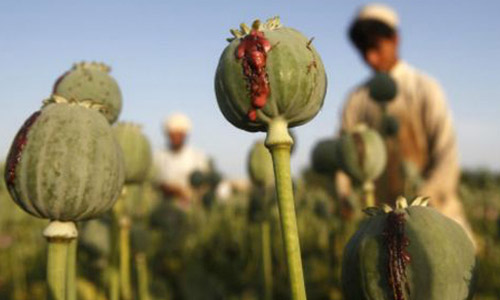In few last decades, Afghanistan has been suffering from three interconnected challenges: Terrorism, opium and Corruption. The first two of them that require both national and international struggle, but tackle the third challenge, which is not less disastrous than the first two is the responsibility of Afghan government. In recent months, air strikes and operations against terrorists has intensified on terrorists as a result many drug trafficking centers, especially in southwest Afghanistan have been destroyed. The main problem is that when a society is engaged with terrorist activity, it also is engaged with drugs trafficking and corruption. So, the question is why there is a sort of strong multilateral dependencies amongst the three factors, especially in unstable societies like Afghanistan? What strategies can be developed to successfully overcome all these challenges? To find the answers of these questions it is necessary to explain the relation of each factor to the other two.
In regard to relation between terrorist and opium trafficking, it is obvious that both are illegal and considered as underground activities and life of each depends on the other one. Terrorism is a series of illegal activities such as killing and intimidation that a criminal group impose on innocent citizens of a country to achieve a political goal or press the ruling government in a society. Financially, terrorism may utilize dissimilar resources depending on context where they perform their activities. In context of Afghanistan, poppy cultivation is the first resource which feed terrorism, especially where the government does not have enough domination. The second part of this illegal resource is opium trafficking which can be performed in form of legal activities such as private trades or government activities alongside other goods.
Usually, the routes of drug trafficking are controlled by terrorists who receive huge amounts of money through the opium transition to continue their terrorist activities. In the absence of terrorist groups, drug traffickers cannot easily operate because the enforcement of laws will cause their activities to be interrupted. As much as terrorism benefits from the narcotics cultivation and considered one of its main funding sources, it is also needed to have control over trade and transition of narcotics as there is a kind mutual dependency on each other.
Unfortunately, Afghanistan has a modest achievement in both aforementioned parts while billions of dollars spent over the last eighteen years on counter-narcotics and terrorism; we can better comprehend the issue when we compare between the achievement and the amount of costs incurred in last two decades. In addition to increasing trend of narcotic trade and its cultivation, many young people addicted and these youths cause a lot of social insecurity such as street crimes, robbing houses, shops and sometimes lead to murder cases. Thus, the fight against drugs and terrorism also cause civilian causalities. There are many cases that terrorist take refuge among civilians and residential houses and this not only slow the security operation but also causes unpredictable civilian causalities. Sometimes when operations are launched on opium producing factories it can also cause causalities where civilians, especially those who are working in or in the neighborhood, are killed. Last week, attacks on drug factories in Nimroz and Farah killed some civilians.
In regard to relation between drugs and corruption, obviously Afghanistan is not in a good position in terms of administrative transparency as it has been ranked among the most corrupt countries in the world. So, one of the main factors that have challenged the fight against drugs and terrorism is corruption. It has been blamed that drug traffickers have been arrested by security forces, but corrupt officer paved the way for their escape. The judiciary system is also blamed for corruption and release of criminals without being punished. Accusingly, the security forces in the border areas are more engaged with drug trafficking activities and play a continuum role with terrorist groups.
Over the past few years, the Afghan government has been fighting against corruption with the support of its international allies, but this fight has not produced good results due to many reasons. As long as the police apparatus which is considered as law enforcement arm does not act transparently against corruption we must not expect drugs or terrorism to be eliminated in the country; as long as the culture of impunity exist in the country no real improvement will take place in both issues.
In regard to relation between corruption and terrorism, terrorism as an undesirable phenomenon grows in society where there are survival beds for its continuity. Since there is no enough government control over the territory, especially terrorists’ centers around the country, there will also be corruption in one way or other as it has repeatedly seen that terrorists have simply passed through security a checkpoint which is a kind of corruption. If the responsible agencies are involved in corruption, the lower ranking officers are easily bribed by terrorist because their main purpose is to obtaining black money that may come from the terrorism or drug traffickers. The culture of impunity is one of main factor of corruption that has played an extraordinary role in spreading terrorism in recent years.
Therefore, the Afghan government who expect political stability in the country should not expect any meaningful achievement without a decisive and honest struggle with all sides of this triangle. Terrorism, drugs and corruption are interconnected, and each of them benefits from the other, and the continuity and survival of each depends on the continuity of the other, but the insecurity is the mother of all evils. In order to achieve sustainable peace and then root out connected issues it is necessary to reduce all sources of tension in the country.
Home » Opinion » Terrorism, opium and corruptions: the catastrophic triangle in Afghanistan
Terrorism, opium and corruptions: the catastrophic triangle in Afghanistan
| Mohammad Zahir Akbari

